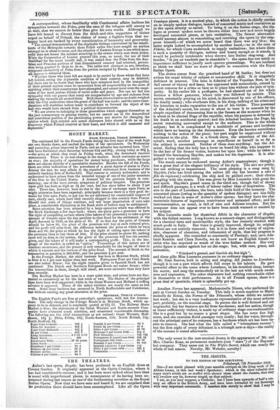THE THEATRES.
Auber's last opera, Haydee, has been produced in an English dress at Covent Garden. It originally appeared at the Opera Comique, where it has had considerable success; and it has been more talked about here than is usual with unperformed pieces, in consequence of its having been an- nounced during last season as one of the forthcoming novelties at the Royal Italian Opera. Now that we have seen and heard it, we are surprised that its production there should have been contemplated. Like all the Opera Comique pieces, it is a musical play, in which the action is chiefly carried on in simply spoken dialogue, instead of concerted music and recitatives as in the opera strictly so called. To bring it on the Italian stage, the dia- logue at present spoken must be thrown either into new and more largely developed concerted pieces, or into recitatives. The former alternative would amount almost to remodelling and rewriting the opera by the com- poser himself,—of which we never heard that there was any idea; the latter might indeed be accomplished by another hand,—as in the case of Fidelio, ter which Costa undertook to supply recitatives: but where there is such a quantity of dialogue, tedious and heavy enough as it stands, it would be perfectly intolerable when thrown into Italian sing-song. :And besides, "le jeu ne vaudrait pas la chandelle": the opera has not merit or importance sufficient to justify such operose proceedings. We are inclined to think we shall hear no more of Haydie in connexion with the Royal Italian Opera. The drama comes from the practised hand of M. Scribe; but does not evince his usual felicity of subject or constructive skill. It is singularly deficient in interest. The hero is Admiral of the Venetian fleet, in the full career of victory and fame, but oppressed with melancholy, caused by secret remorse for a crime so base as to place him without the pale of sym- pathy. In his earlier life a profligate, he had cheated out of his whole fortune a fellow gamester, whose ruin was followed by suicide. This secret, constantly preying on his mind, is discovered by one of his officers, his deadly enemy; who overhears him, in his sleep, talking of his crime and his intention to make reparation to the son of his victim. Thus possessed of the Admiral's secret, his enemy is about to turn it to account by the simple expedient of denouncing him to the Senate at the moment when he is about to be elected Doge of the republic, when his purpose is defeated by his death in an accidental quarrel; and the Admiral becomes the Doge, his secret remaining unrevealed except to the audience. This is the whole subject; but it is complicated by a multitude of persons and incidents which have no bearing on the denouement. Even the heroine contributes nothing to the action of the piece: her part might be suppressed without detriment to the plot. She is a Greek slave, the attendant of the Ad- miral's ward, another personage as superfluous as herself in so far as the subject is concerned. Neither of them does anything: but the Ad- miral, finding that the lady has a lover on board his ship, who happens to be the heir of his former victim, bestows her upon him; while he takes to himself the fascinating Haydee, and makes her his dogaressa. It is alto- gether a very confused story. The music cannot be reckoned among Auber's masterpieces; though it has a great deal of the elegant brilliancy of his style. The airs are pretty, but not striking or impassioned. The most pleasing is a song sung by Haydde, (who has lived among the sailors till she has become a sort of flue du regiment,) celebrating the ship and its gallant crew; their chorus mingling with the strain. This was given by Miss Lucombe with great fire and spirit. Haydde's grand scans in the third act, though full of showy and difficult passages, is a work of labour rather than of inspiration. The airs in the part of Loredano, the hero, take little hold of the memory. The concerted pieces (owing to the quantity of spoken dialogue) are less fully worked out than in some of Auber's other operas; but they have his cha- racteristic features of ingenious contrivance and animated effect; and his instrumentation, as usual, is full of nice and delicate touches. But the composer does not appear ever to have been much warmed or excited by his subject.
Miss Lucombe made her theatrical debtlt in the character of Haydde, with the fullest success. Long known as a concert-singer, and distinguished for a classical taste and musicianlike style, she has recently studied with much profit in Italy. Her voice is greatly improved, though its original defects are not entirely removed; but it is in force and variety of expres- sion, clearness of elocution, and refinement of style, that her progress is chiefly apparent. She reminded us constantly of Persiani; and, save Ade- laide Kemble and Clara Novello, we do not know an English female vo- calist who has acquired so much of the true Italian method. Her very petite figure is rather against her on the stage; but, with ease, grace, and animation, " Pritchard's genteel, and Garrick six feet high"; and these gifts Miss Lucombe possesses in no ordinary degree.
Mr. Sims Reeves, both in acting and singing, did justice to Loredano;
though it is not a part which affords full scope to his talents. He gave powerful effect to the scene where Loredano, in his troubled sleep, betrays his secret; and sang the melancholy air in the last act with much sweet- ness and expression. The other characters had nothing remarkable either in themselves or their performance. As in all French operas, there is a great deal of spectacle, which is splendidly got up.


























 Previous page
Previous page